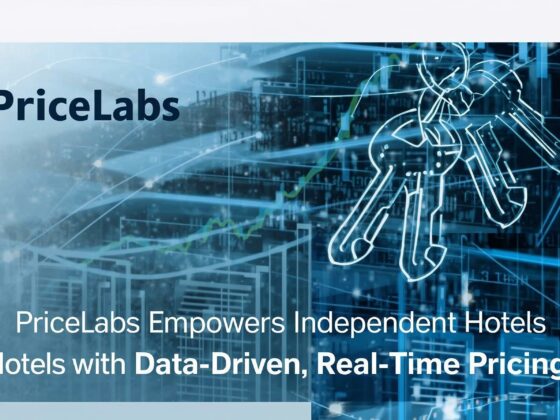Why do hotels spend more on FF&E than tech? A framework for loyalty. CHANEL is getting into sports too. Travel agents + AI agents the likely future.
Hello,
AI tools and agents are so easy to use it is hard to imagine a future where they’re not being used in every possible scenario. It is literally the bicycle for the mind, and I think this might mean the comeback of travel agents.
Best, Martin
Sponsored by Klairhaus. Support the newsletter, treat someone to great office gadgets.
How Can Emotion, Memory, and Meaning Transform Loyalty?
I have a lot of opinions on hotel loyalty systems. Real loyalty isn’t a rewards card (but it helps). A friend published “The Ritual Advantage” playbook that emphasizes the importance of designing brand rituals that create lasting emotional connections with customers. It is harder to do than just issue rewards, but much closer to real loyalty.
LUXURY BRAND RITUALS
White Lotus, Hotels, Tech
“The White Lotus” is an insightful case study for hoteliers, dramatizing the complexities of guest relations and the performance art of hospitality. The show underscores that a hotel is more than just a building; it’s a stage for human drama, where genuine connections are the essence of the guest experience. But also it shows how much of a hotel manager (and staff) bandwidth is consumed by non-tech problems, and why we need to build better tech (see column below).
HOSPITALITY HUMAN DRAMA
About me: I'm a fractional CMO for large travel technology companies helping turn them into industry leaders. I'm also the co-founder of 10minutes.news a hotel news media that is unsensational, factual and keeps hoteliers updated on the industry. Phone bookings are a thing
A recent report showed that there’s still a significant value in phone bookings – it is called voice bookings in the report – which is an odd name. The value of phone bookings has also been fewer cancellations as there is a personal connection. AI voice can massively help here. The recent demo of Sesame was impressive. But then it’s not a personal connection though. Do we start with AI and hand-over to a human to complete the booking?
VOICE IN HOSPITALITY SESAME
Chanel: more Luxury + Sports partnerships
The growth of sports marketing and sponsorships by luxury brands isn’t stopping. After LVMH in olympics and F1 etc, Chanel will become the Title Sponsor and the official Timekeeping Partner of the The Boat Race, renaming the event to The CHANEL J12 Boat Race starting in 2025. The Boat Race is a historic UK sporting event and is a nice brand association for Chanel.
CHANEL BOAT RACE
The Orient Express
Maybe it’s because of the exceptional content marketing by Agatha Christie, maybe it is something else. But luxury train journeys seem like the best thing in the world. Now a new line in italy. La Dolce Vita Orient Express, which promises a unique travel experience through 14 Italian regions with high-end amenities including three-star Michelin cuisine. What’s not to like.
LUXURY TRAIN ITALY
Will AI agents be the new Travel agents?
There’s so much more to a travel agent than managing bookings. Insurance, accountability, etc etc. I don’t think AI agents will replace travel agents. But travel agents will use AI agents to do all the heavy lifting, then verify the work, adjust and suggest. It could be how we bring back independent travel agents – and have people to talk to again. Is this how Travel Agents make a come-back?
AI REVOLUTIONIZING TRAVEL
Podcast: I was invited on the Hospitality Daily Podcast and spoke about technology in hospitality, some thoughts on what wont change in hospitality, and why I co-founded 10minutes.news. Best, MartinOpinion
Why Hotel Tech Doesn’t Move Faster
Digital transformation in hotels isn’t stuck because hoteliers are scared of spending. In fact, hotels spend millions every decade on renovations, replacing FF&E (furniture, fixtures, equipment), and upgrading HVAC systems without blinking. So it’s not about cost aversion.
It’s about the perceived return on tech—and more crucially, the pain of getting there.
Unlike a room refresh, which shows immediate impact on guest satisfaction and average daily rate, tech upgrades are an invisible improvement. And they come with short-term disruption which is extremely real: retraining staff, adjusting workflows, and dealing with the inevitable problems when new systems go live. The gains are long-term and hard to quantify; the pain is immediate and very measurable.
I’ve been a hotel managers going through PMS change, and the disruption is real (even if the system was better). Every team—front desk, housekeeping, reservations, night audit—needs training. Productivity takes a hit. Tempers flare. Guests feel it. And the manager has to hold it all together with a “smile”.
Also, B2B software rarely “just works.” And unlike consumer tech, hospitality systems need niche functionality to handle the unique complexity that every hotel seems to have. The tools are built to be feature rich, not user friendly (yes, there are exceptions).
In my opinion change management is the real blocker to hotel tech adoption.
We don’t need better sales decks or flashier features. We need tech that’s easier to implement, intuitive to use, and respectful of the chaos that is daily life in a hotel. We need training tools that don’t assume everyone works 9-to-5 from a desk.
It’s rational for hotels to favor the furniture upgrade over the software one. One brings direct revenue. The other brings disruption with a promise of future optimizations, it is the emotional perspective, the rational one is that tech is directing the majority of our lives today.
If only we could build systems that were so easy to use that there was not training needed.





